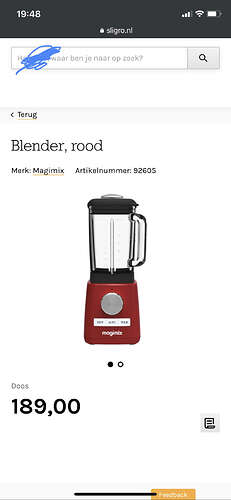Ik heb zowel zelf gedroogde bloemen als gekochte droogbloemen en ze zijn allemaal geurloos. Wellicht dat er inderdaad iets op gespoten is?
Ik verlaat mijn werkplek. Iemand een idee wat ik behalve taart kan achterlaten? Ik heb het daar echt heel leuk gehad.
Koektrommel, pot snoep
Nee dat zijn 2 verschillende forummers hehe
Hahaha twee verschillende forummers, die elkaar wel goed kennen en beide vegan zijn!
Ik heb deze ketting: Ketting Refined Katja 50 cm nu drie jaar en een paar maanden (gekocht in augustus 2018 bij de plaatselijke juwelier). Een paar weken geleden brak de ketting precies op het punt waar het aan een balletje vastzit. Dat heb ik bij die juwelier laten repareren, kostte 25 euro dus dat is te overzien. Nu breekt net alweer de ketting op een punt bij een balletje, maar wel een ander balletje dan de vorige keer.
Vrijdag ga ik ermee terug maar eigenlijk ben ik best boos/teleurgesteld. Het is natuurlijk geen topsegment voor de juwelier, maar ik vind het een behoorlijk prijzige ketting en je mag toch wel verwachten dat hij langer dan 3 jaar meegaat? Zelfs zinzi spul blijft beter.
Ik draag de ketting niet eens dagelijks, zou zeggen max 1-2x per week en nu met corona soms weken niet ivm thuiswerken. Verder spuit ik er geen parfum op en douche en slaap ik er niet mee etcetera.
Ik wil sowieso zeggen tegen de juwelier dat dit niet de kwaliteit is die ik van hem gewend ben, maar is het ook redelijk dat ik wil dat hij ditmaal de reparatie betaalt?
Ik zou buddha to buddha gewoon mailen
Ik zou dit gewoon vertellen aan de juwelier, voor haar/hem ook goed om te weten en vaak hebben ze wel contact met iemand van inkoop ofzo, zijn misschien wat kortere lijntjes dan zelf met het merk mailen.
Is er hier toevallig iemand die bezorgklant is van de Sligro en voor mij een prijs zou kunnen checken? Ik heb wel een klantenkaart maar kan niet inloggen op de website dus ik kan ook geen prijzen zien ):
Ik ben geen bezorgklant maar kan volgens mij wel prijzen zien met mijn account. Wat wil je weten?
Oh wat chill! De prijs van een Magimix blender haha 
Ah superfijn, dankjewel!!
Ik zit er nu voor de 2e keer in! Ik zou zeker dit bad aanschaffen (2 persoonsopblaas bad van de Kruidvat)
Groot zat voor 2 normale mensen
Ongevraagde reactie, maar deze blender is echt heel fijn haha
Ik zag vorige week bij Sligro de lichtblauwe powerblender van magimix in de aanbieding voor 139! Ik wilde hem zelf bijna kopen, maar heb de zwarte al en vond twee blenders toch net iets te overdreven 
Jaa mijn skere blender is laatst kapot gegaan dus besloten maar een keer te investeren! En toen zag ik dat de Sligro ze ook had dus ik dacht dat scheelt misschien nog wat 
@Alicante omg wat chill! Ik heb zaterdag tijd om te gaan dus hoop dat dat dan ook nog is! Maar anders is 189 nog altijd iets goedkoper dan in andere winkels (:
De blauwe is nu op de site niet (meer) in de aanbieding zie ik. Kun je de btw terug krijgen met jouw bedrijf? Mocht dat niet zo zijn is deze van de Bijenkorf ook goed geprijsd:
Ah jammer! Ik denk niet dat ik het kan verantwoorden als bedrijfsaankoop ben ik bang, was anders wel een goeie geweest ja!
Edit: ik bedenk me nu dat Sligro prijzen natuurlijk ex BTW zijn of niet? Dan ben ik daar denk ik duurder uit dan bij de Bijenkorf 

 Maar dit is idd ook een goede verwarring
Maar dit is idd ook een goede verwarring